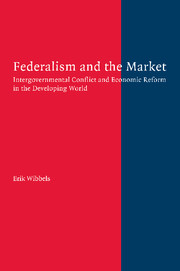Book contents
- Frontmatter
- Contents
- Acknowledgments
- 1 Intergovernmental Bargaining and Economic Policy in Federations
- 2 From Market-Preserving to Market-Distorting Federalism: Divergent Incentives and Economic Reform in Developing Nations
- 3 Federalism and the Decentralized Politics of Macroeconomic Policy and Performance
- 4 Testing the Model: Macroeconomic Reform Beyond the Federal-Unitary Distinction
- 5 Partisan Harmony, Intergovernmental Coordination, and Market Transitions: The Case of Argentina
- 6 Regional Competition, Fiscal Dependence, and Incentives in the Argentine Provinces
- 7 The View from Below: The Politics of Public Sector Reform in Three Argentine Provinces
- 8 Conclusion: Federalism, Reform, and Enduring Puzzles
- References
- Index
1 - Intergovernmental Bargaining and Economic Policy in Federations
Published online by Cambridge University Press: 20 July 2009
- Frontmatter
- Contents
- Acknowledgments
- 1 Intergovernmental Bargaining and Economic Policy in Federations
- 2 From Market-Preserving to Market-Distorting Federalism: Divergent Incentives and Economic Reform in Developing Nations
- 3 Federalism and the Decentralized Politics of Macroeconomic Policy and Performance
- 4 Testing the Model: Macroeconomic Reform Beyond the Federal-Unitary Distinction
- 5 Partisan Harmony, Intergovernmental Coordination, and Market Transitions: The Case of Argentina
- 6 Regional Competition, Fiscal Dependence, and Incentives in the Argentine Provinces
- 7 The View from Below: The Politics of Public Sector Reform in Three Argentine Provinces
- 8 Conclusion: Federalism, Reform, and Enduring Puzzles
- References
- Index
Summary
Federations across the developing world are in economic trouble. Argentina, Russia, India, Brazil, Nigeria, Pakistan, Mexico, and others are all struggling to varying degrees with profound economic challenges. Only recently, however, have academics, journalists, and the international financial community begun to recognize the distinctly federal roots of some of these problems. In Argentina, which recently experienced one of its worst economic crises of the last one hundred years, chronic provincial overspending and intergovernmental conflicts have been crucial ingredients in that nation's economic freefall. In a less spectacular but equally telling case, the popular press reported throughout 2000 and 2001 that the Indian states were obstructing the federal government's economic reform agenda by reneging on agreements to privatize state-owned electricity companies. Similarly, in 1999 intergovernmental conflicts over state debt in Brazil helped trigger the run on that nation's currency, the real. More recently, the new Worker's Party government of Lula da Silva faces an awe-inspiring debt burden caused in large part by a decade of federal bailouts of overspending states. Post-Soviet analysts of Russia tell an analogous story of Russia, suggesting that the strength of regional bosses has precluded a coherent national approach to privatization, government restructuring, and fiscal policy.
What is striking about these (and other) federations is how important regional governments are in shaping economic reform processes aimed at giving market mechanisms greater sway.
- Type
- Chapter
- Information
- Federalism and the MarketIntergovernmental Conflict and Economic Reform in the Developing World, pp. 1 - 16Publisher: Cambridge University PressPrint publication year: 2005



